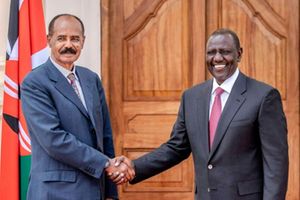Premium
Why most men fear dying alone

I entered this world whimpering; I would love to exit it while worshipping.
What you need to know:
- We all die the same way we came out of the womb; alone.
- That said, I understand where these men are coming from. Being ushered into the afterlife shows a man that he is loved. It reassures him that there are people who deeply care about him.
Some men are freaked out by the prospect of dying alone. They want others, a spouse or children, to usher them into the Hereafter. I think this phobia has a lot to do with our belief that the process of dying is lonely.
And, to an extent, it is. We all die the same way we came out of the womb; alone. That said, I understand where these men are coming from. Being ushered into the afterlife shows a man that he is loved. It reassures him that there are people who deeply care about him.
Read: Just a Man: The formula for a revival
This belief puts celibate childless men in a quandary. What’s a celibate man supposed to do when the Grim Reaper comes knocking? Who will be by a childless brother’s side when his mortal end draws nigh and he inches ever so closer to his immortal start?
Though, a man can transition while surrounded by harems yet still die alone. It happens when, for instance, folks care more for what a man is leaving than for the man who’s leaving.
Fear not. I was homeless right at the onset of Covid-19, one day before the nationwide lockdown. This was when there were reports that in some countries, people were falling dead on the streets. Great fear pervaded all the countries, nationwide.
“Lord, I don’t care if I die alone in a trench,” I used to pray. “But, please, let praise and worship never die in my lips. If it is Your will that I die alone, I don’t care as long as I enter Your gates with thanksgiving.”
It’s simple, but somewhat complex at the same time: If you remove sin and fear from the transition equation, death loses its sting.
And once that happens, dying alone ceases to be such a big deal.
That Covid-19 prayer is still my transition petition: “Lord, I entered this world whimpering; I would love to exit it while worshipping.”
Me? I know my afterlife destination. I am not afraid to go to my heavenly home. Because of this knowledge, I don’t care whether I die alone in the middle of the Sahara or if my plush air-conditioned hospital room is bursting at the seams with well-wishers, flowers and cards.
There are deathbed repentances. These are eleventh-hour spiritual conversions that happen right before death. However, one’s eternal destination largely depends on how they have lived their life.
Which is why a man must live a righteous life.
Always. Why? You don’t know when and how you will exit.
When a man knows his eternal destination, it eases him from the unnecessary worries that plague some men during the process of transition.
For me, I would rather die alone yet firm in the knowledge that I will not be eternally separated from God.
Hospice workers say that no one ever dies alone. There are always otherworldly activities when one’s about to transition. Sometimes these visits can be felt by all and sundry. Other times they can only be perceived by the dying person.
It appears to me that these otherworldly visitors are sent from heaven to ease men from “transition terror”. Their purpose is to help us shed off our mortal proclivities for us to be clothed in immortal flesh. Why? Because a man cannot enter eternity in his corporeal nature.
I don’t fear dying alone because I know there are hordes of heavenly helpers who are rooting for me. They desire for me to enter into eternal rest. They are my welcoming party.





